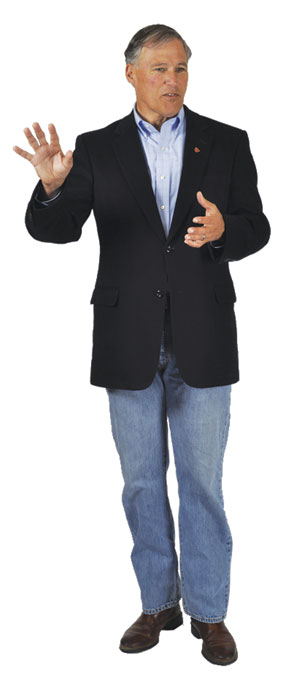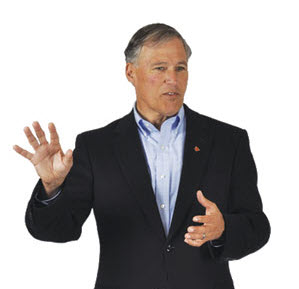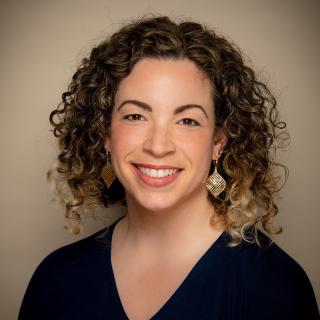Jay Inslee, the Democratic candidate for Washington state governor, is a former member of the U.S. House of Representatives for Washington’s 1st Congressional District, serving from 1999 until he resigned in March to focus on his gubernatorial campaign. Inslee is a fifth-generation Washingtonian who grew up in White Center. After graduating from Ingraham High School, Inslee married his high school sweetheart, Trudi, and the two raised their three sons in Yakima Valley.
 Who is your political hero?
Who is your political hero?
Abraham Lincoln. I think he’s the closest to understanding the uniqueness of America — a good Republican.
What is your position on marriage equality?
Trudi and I have been in a delightful marriage — we just celebrated our 40th anniversary. I fundamentally do not believe that any politician, east or west, Republican or Democrat, urban or rural, should be able to tell any of my fellow citizens who to love or who to marry.
This is an individual choice. I believe moving forward in marriage equality is very consistent with who we are as a people in the state of Washington. We do embrace people for their diversity. We respect the importance of parenting, frankly. Stability in parenting, I think, can be important. For all those reasons, I believe this is another step forward for Washington to lead the country as we have in so many ways. I'm very hopeful that the vote will be in favor of marriage equality.
Washington has been fighting a multiyear battle on the issue of easy access to emergency contraceptives, which some pharmacists object to providing. Where do you stand?
This is a very important issue for men and women. I believe in the ability of Washingtonians to make their own decisions about their family’s future. Couples need access to family planning services, including emergency contraceptive services.
What are your change points on education?
We need to do a better job. There is some great teaching going on today, and we have some students doing well, but we have a long ways to go.
There are two facts that I want to emphasize — these are the most troublesome statistics to me. We are the first in the United States per capita in the number of high-skilled, high-tech jobs that we have. But we’re number 46th per capita in the number of students that we educate to fill these jobs. That is wholly unsatisfactory. So my belief is we have to embrace an education reform measure that will make sure every child has access to a middle-class job, that every child has a future, a vision statement of their own, on how they’re going to get access to a middle-class job — with a particular emphasis on the ability to find high tech positions.
I’m dedicated to having universal access to early childhood education … and full-day kindergarten. Neuroscience shows that if we get access to these young children, we can do great things. Second, I’m dedicated to making sure we have an excellent teacher in every single classroom. [We’ll] continue to insist on a stronger evaluation system … to make sure we fully evaluate teachers. [And we’ll] use that evaluation system in personnel decisions.
My dad was a teacher, and he was an excellent teacher and coach. I want every teacher to have an excellent teacher and we're going to make sure that's the case. Now to do so, we're going to have a better mentoring program for teachers. I'm proposing a mentoring core of teachers that can help train other teachers, young teachers in particular. Pay those teachers additional compensation to provide mentoring to help young teachers. We found, if we can provide teachers better training in math and science, that it can be translated to closing the achievement gap, which is dramatic between groups in our society.
Next, we’ve got to have high expectations for every student. We’ve got to do the kind of thing that Federal Way has done, which is to essentially sign up kids, particularly minority youth, for AP classes. I’ve got a plan also to deal with this dropout problem. I’m seeing that schools can really succeed in reducing dropouts if they have a risk-based assessment and teams of adults to focus on insisting that students graduate.
How you are going to fund improvements?
We clearly do need additional revenue for the state in order to meet our educational mandate. But to get those revenues, we’ve got to focus first on the thing that has been the problem: people out of work. We have 300,000 people out of work. As a result of that, those people have reduced buying products and services, and we’ve reduced the collection of taxes and revenues. So the best solution is to get people back to work.
Now there are some other things we have to do to free up more revenues. Look, we have a lot of archaic corporate tax loopholes that some lobbyists got years ago that no longer make sense. I believe we should require those loopholes to be evaluated on a regular basis … if they’re not helping the economy grow, they need to be closed and have that money go back into our schools. We have to get health care inflation under control, so we can take some of that money and put it back into our school system. Last, we need to find some more efficiencies in state government itself. I am embracing and calling for a lean management system to bring into our state system the efficiencies that we've had in private enterprise, at Boeing and Virginia Mason Hospital. We’ve got to take those constant quality measures and put them to work in state government — all the way through state government. Not just in little dibs and dabs like we have right now, but throughout state government. I'm dedicated to that. So if we do these four things, we're going to find additional resources for schools. We've got to do that.
What’s your plan for job creation?
My plan focuses on what we do so well in Washington, which is to innovate. I believe it’s our destiny to do that in clean energy, in life sciences, in bio technology, in aerospace, in advanced agriculture products. I have 75 very specific proposals on how to do that. To just give you one example: We’ve got a plan to build new companies by taking research out of our colleges. There is tremendous R&D that has been going on in our colleges. [We want to] put it into the commercial sector and grow small businesses.
An important part of my job s plan is my education plan, because I recognize, if you're going to have a pipeline of products, you've got to have a pipeline of people. That's why, intrinsic in my jobs plan, is a plan to provide for the education opportunity of everyone in our state. They go together like a hand and glove — education is the driving force of an innovative economy, and that's why I focused on education as well.
What is your position on the legalization of recreational marijuana, on the ballot this November?
I’m not supportive of the measure [to legalize]. I am supportive of a different approach. I support people’s access to medical marijuana. I also think we ought to reprioritize some of our law enforcement resources now involved in recreational marijuana prosecution and investigation.
Some of our readers had some questions for you. How do you intend to address the soaring cost of higher education?
Well first off, that is entirely correct. We cannot be putting these tens of thousands of dollars of debt burden on our children when they can get loans. This is unsustainable from the perspective of us as parents, but it’s also unsustainable for these research institutions, which are such a driving force of our economic development. You know, you look at companies around the state of Washington, many of them came as spinoffs from these colleges. If we start to starve these colleges, we will start to degrade and erode our ability to be an innovative economy.
We are putting an intolerable burden on our students. We need to plow back investment into our colleges, by putting people back to work and increasing revenues to our state. And I’m supportive of reducing the borrowing costs when students do have loans. We also need to reduce the operating costs of these colleges … by removing red tape.
Another reader question for you, Jay: What are your thoughts on breastfeeding in public?
I definitely favor breastfeeding as a personal choice, and we’re going to find a way to make sure women have the ability to do that.
Editor's Note: We also invite you to read our Someone You Should Know Q & A with Washington's Republican candidate for governor, Rob McKenna.




 Jay Inslee, the Democratic candidate for Washington state governor, is a former member of the U.S. House of Representatives for Washington’s 1st Congressional District, serving from 1999 until he resigned in March to focus on his gubernatorial campaign.
Jay Inslee, the Democratic candidate for Washington state governor, is a former member of the U.S. House of Representatives for Washington’s 1st Congressional District, serving from 1999 until he resigned in March to focus on his gubernatorial campaign. 






